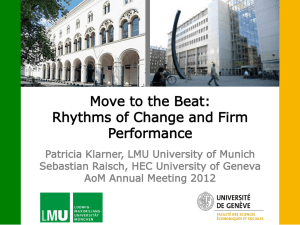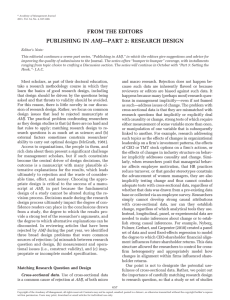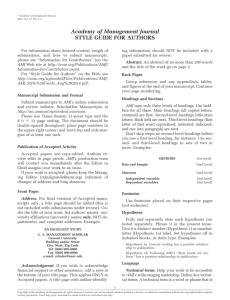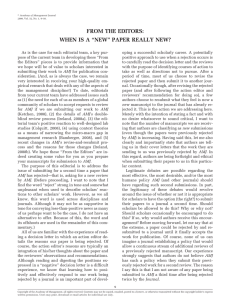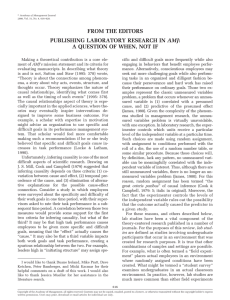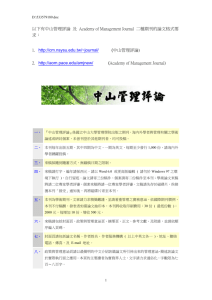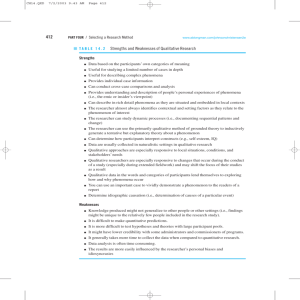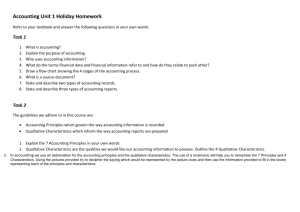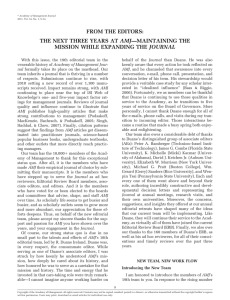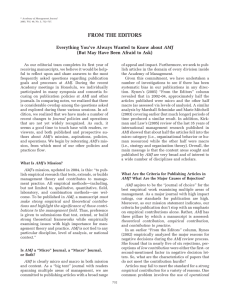Publishing in AMJ: Tips from the Editors AOM 2015 PDW Vancouver Gerry George
advertisement
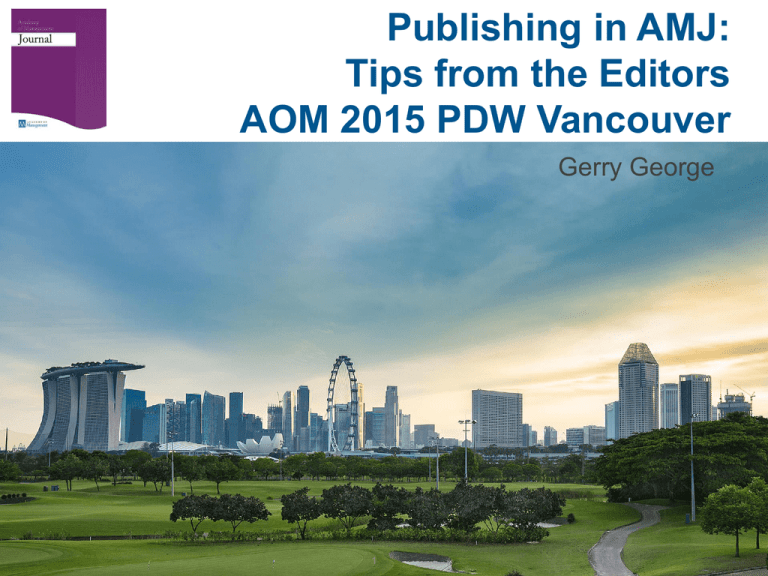
Publishing in AMJ: Tips from the Editors AOM 2015 PDW Vancouver Gerry George 1 Topics • Some AMJ statistics • What kinds of papers fit AMJ’s mission? • The editorial team • Reviewing for AMJ • Tips for improving your chances at AMJ Some AMJ Statistics • Now in its 58th year • Receives 1250 original submissions per year (1500+ total including revisions) • 52-day turnaround for fully-reviewed submissions • Highest impact factor among exclusively empirical management journals 6.5 (2 year) • Has 12 papers an issue, 72 papers per year AMJ papers... • Conversations – Does your study define a new conversation (theory/lens/paradigm) or divert an existing conversation into a meaningfully different area? • Context – True to context, inspired by phenomenon – Relevant and interesting to managers (broadly construed) • Credible – Rigor in study design and data analysis – Persuasive in its argument and framing of issues What Papers Fit AMJ’s Mission? • Mission Statement – The mission of the Academy of Management Journal is to publish empirical research that tests, extends, or builds management theory and contributes to management practice. All empirical methods-including, but not limited to, qualitative, quantitative, field, laboratory, and combination methods--are welcome. To be published in AMJ, a manuscript must make strong empirical and theoretical contributions and highlight the significance of those contributions to the management field. Experimenting at the fringes Focus on the phenomenon • Strong theoretical contributions need not imply weak adherence to the phenomenon • Bring the richness of the context into the study • How can we make this practical? – Explain the phenomenon a lot more in the intro, hypotheses development and discussion – Use the introduction to situate theory, but also why the setting makes it an interesting anomaly – Explain how theory is enriched by the context – Experiment with the format, multi-method, interview data 6 Experimenting at the fringes Frame for Impact and Relevance • Big problems, unanswered questions • Important phenomenon of managerial interest • Trends shaping organizations and their futures • Bring impact centre-stage – – – – Picking topics that are Grand Challenges Blending theoretical contribution with managerial relevance Shaping ‘Managerial Implications’ as a central piece Using the From the Editor notes as stage setters 7 What Papers Fit AMJ’s Mission? • For more info, see http://aom.org/amj/ Heuristics on process and acceptance rates 8% acceptance rate Every month: Desk Reject/Edit 100 Manuscripts 40% (60 reviewed) R&R 30% (42 rejected, 18 revised) (approx. 1 in 3 reviewed papers get a revision) R1 50% (9 revised, 9 rejected) (30% of revisions get a conditional accept in R1) R2 10-20% (8 accepted, 1 rejected) The Editorial Team • What happens when a manuscript is submitted to AMJ? – First stop: Mike Malgrande, Managing Editor – Second stop: Gerry George, Editor-in-Chief • Reads submissions to determine desk decisions and action editor assignment • Handles desk decisions for macro papers, delegates some desk decisions for micro papers • Pick clear and substantive KEYWORDS – Third stop: Action Editor • Chooses five reviewers in an effort to sign up three • Makes final decision on manuscript How reviewers score papers Rating each paper Reviewer Resources at AMJ Improving Your Chances at AMJ • Four most common themes for rejections: – – – – Theoretical Contribution Novelty Scope Technical Adequacy Improving Your Chances at AMJ • Get “friendly reviews” from colleagues who publish in, and review for, AMJ, at each of these stages: – Topic choice – Study design – Writing What We Do Answer Interesting Unanswered Questions Tell the Story Scott Graffin 16 The Introduction’s Importance • Creates readers’ first impression of the study • Determines whether readers move on to the rest of the article • Frames how reviewers read the remainder of the paper – looking for reasons to give a revision, or reasons to reject 17 Key Questions • Who cares? • What do we know, what don’t we know, and so what? • What will we learn? 18 Who Cares? • “Hook” the reader – Capture their attention and interest • Highlight why the study matters to both theory and practice • Two most prevalent hooks used by the AMJ Best Paper Award winners: – The Quote – The Trend 19 Who Cares? • The Quote: Quotation or vignette that engages the reader in the intriguing and practical nature of question Alex Trotman's goal: To make Ford No. 1 in world auto sales. Kellogg's cutting prices . . . to check loss of market share. Amoco scrambles to remain king of the polyester hill. - Ferrier, Smith & Grimm (1999) 20 Who Cares? • The Trend: Highlight trends in the real world or the academic literature that are important or represent some puzzle or paradox • “Moreover, people associate creativity with a variety of other positive attributes, including superior intelligence, humor, and leadership ability (Sternberg, 1999). Such beliefs have helped spawn a virtual cottage industry of management books and business school courses that extol the virtues of creativity and provide suggestions for eliciting higher levels of creativity” – Elsbach & Kramer (2003) 21 What do we know, what don’t we know, and so what? • Identify the Conversation: Focus on one scholarly “conversation” (Huff, 1999), where it hasn’t gone, and why it needs to go there (Locke & Golden-Biddle, 1997) • Synthesized Coherence – Identify two conversations and bridge across them – Progressive Coherence – Identify an ongoing conversation and describe how it needs to move forward – Non-Coherence – Present competing perspectives reflected in the same or different conversations and explain how you will adjudicate between them 22 What do we know, what don’t we know, and so what? • Problematize your Contribution: Establish how the current state of the conversation is deficient (Locke & Golden-Biddle, 1997) • Incompleteness: Field needs to be developed further – Can be too incremental • Inadequacy: Fails to incorporate important perspectives • Incommensurability: Is altogether inaccurate – Can be overly antagonistic 23 What do we know, what don’t we know, and so what? • Give readers a clear sense of how you will deliver on your promise to change, challenge, or advance the conversation that you have entered • “Just because a gap exists does not necessarily make the study interesting or worthwhile.” – Outstanding Reviewer • “Not all gaps need to be filled!” – Different Outstanding Reviewer 24 What will we Learn? • Consensus Shifting: Identify widely-held assumptions, proceed to challenge them, and describe the implications for ongoing research • Consensus Creation: Show a lack of consensus in the literature and describe how your study either clarifies the lines of debate or resolves the conflict (Hollenbeck, 2008) 25 Pitfalls and Common Mistakes • Fail to Motivate and Problematize • Assume motivation is obvious • Assume there is inherent value in being “the first” to study something • Focus more on “gap filling” than on addressing a question, problem, puzzle or paradox 26 Pitfalls and Common Mistakes • Lack of Focus – Try to cram too much in; becomes long and rambling – Try to use too many rhetorical fireworks and never say what the paper is about and why we should care – Spend too much time describing the structure of the paper 27 Pitfalls and Common Mistakes • Overpromising • Set overly-high expectations by claiming contributions that the theory and/or results don’t deliver • Research questions in introduction don’t match the rest of the paper • Make claims so extravagant they seem outlandish and self-serving 28 An Effective Introduction • Is short and focused; 3-4 double spaced pages • Hooks the reader and makes them care about the study’s topic • Clearly states the research question and its relevance – i.e., identifies what we know, what we don’t know, and why it’s important • Clearly enumerates the study’s contributions and explains what we’ll learn • Doesn’t write checks the rest of the article can’t cash 29 AMJ: A global journal International Authors (30+ countries since 2010) International International Editorial Team Readers (15 countries) (110 countries) A commitment to making AMJ a global journal in submissions, acceptances, and readership Reasons for Rejection • Framing and contribution • Theory and method • Presentation Framing and Contribution The pitfall: • • Location is not automatically a contribution! What’s the contribution to theory? Framing and Contribution Common examples of weak frames • “Construct in country” papers that examine wellestablished constructs in a new context • “Comparative country” papers that present descriptive differences across contexts using well-established constructs • Any frame that puts the context more front-andcenter than the theory Framing and Contribution Creating stronger frames • Shift the theoretical question to the foreground • Context may be immaterial, or • Context may change, expand, or bound our understanding of the theoretical relationships Examples: Board gender diversity in Australia Racial diversity in Malaysia Theory and Methods The pitfall: • • • Under-developed theory and/or Inadequate research designs Use the right tool for the job! Theory and Methods Common examples of weak theory/methods • “Theory development by citation”; causal reasoning and well-grounded hypothesis statements are lacking • Using cross-sectional data to test causal, longitudinal, or temporally sensitive arguments • Samples that are too small, truncated, or otherwise poorly matched to the research question • A flawed design will undo a solid front end Theory and Methods Creating stronger theory/methods • Apply the most rigorous methods possible in your location – to test and expand theory • Develop expertise with the most portable methods (qualitative interviews and intensive case studies) – to develop theory Example: Australian SMEs Presentation The pitfall: • • It’s not the English! It’s about more subtle (and more fundamental) communication missteps ScholarOne’s American Journal Editors feature (on the author dashboard of manuscript central) Presentation Common examples of weak presentation • Failing to follow “house style” in article/structure, reference formatting, or table/figure presentation • Failing to follow “house style” in the paper’s meta-structure – how arguments are laid out • Failing to build on mutual knowledge – by citing inaccessible material or leaving out critical background Presentation Creating stronger presentations • Know the conversation you are joining • Immerse yourself in the journal’s “house style” • Anticipate the reader’s expectations; you may need to educate the reader if expectations are inapplicable • Use peer reviewers who know the “house style” Examples: OB/HRM vs IR/HRM American demographics Developing Strong Qualitative Papers Theoretical Contribution • Significantly advances understanding of the phenomenon; changes, challenges, or fundamentally advances knowledge…causes us to think about a phenomenon in a new way • Creates new theory or elaborates existing theory • Shows transferability/analytic generalizability • Moves beyond description…avoids amazing examples of the obvious Developing Strong Qualitative Papers Empirical Rigor • Provides transparency about how data were collected and analyzed, what is motivating the study, why the site and method(s) are appropriate • Cites sources to support the method(s) used • Establishes the adequacy of the sample… – Nature of phenomenon—broad sweeping or more narrow? – Nature of data—rich or more mundane? Developing Strong Qualitative Papers A Convincing and Compelling Story • Integrates rather than merely mentions data sources (e.g., interviews, archival, participant observation, etc.) • Showcases and interprets data in meaningful ways (balance of showing and telling) • Completes the analysis • Establishes a clear line of sight from data to theorizing about it…equifinality Developing Strong Qualitative Papers Ideas and Resources • Deconstruct and model qualitative papers published in AMJ • Invite a friendly review by a qualitative researcher • Sit in on qualitative sessions at the Academy • Check out author resources for qualitative research on AMJ’s website • Consult well-accepted texts or articles on the method(s) you are using What Next? Meet the Editors! Table Rotations 15-20 minutes each rotation Two rotations! See Name Tags and Table Numbers
